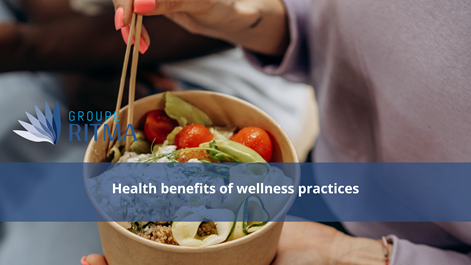
Chronicles
17 May 2023
HEALTH BENEFITS OF WELLNESS PRACTICES

The latest advances in science on stress and genes:
Emotions and stress play a major role in diseases
Studies confirm that factors such as love and gratitude, pleasure, appreciation or anger and anxiety influence a person's genetic blueprint.
A group of researchers from McGill University studied the issue in rats. They discovered that the maternal attention of a rat mother impacted the activity of a gene in the hippocampus (a part of the brain mainly involved in learning and memory) of her newborns. Mother rats who cuddle and lick their pups more frequently than others prevent their offspring from stress by modifying the epigenetic code of the NR3C1 gene of their young. This gene translates into a protein that helps lower the concentration of a stress hormone in the body. Mama rat's hugs result in a specific epigenetic activation of the NR3C1 gene.
Thus, the little rats who are deprived of their mother live in a constant state of stress. Maternal attention is therefore able to affect genes and modify the stress response in adulthood. Epigenetics serves as an interface between our environment and our genes and can influence our response to stress.
When we are stressed or are negative, our biological energy reserves are diverted from the important task of creativity, regeneration.
Chronic stress, when one experiences stressors over an extended period of time, can lead to long-term exhaustion of the body. As the autonomic nervous system continues to trigger physical responses, it causes wear and tear on the body. It's not so much what chronic stress does to the nervous system, but what continued activation of the nervous system does to other bodily systems that become problematic.
Increasing the feeling of well-being is important because it allows you to:
Increase resistance to stress and prevent disease
Boost morale, maintain sanity
Foster increased creativity
Optimize the immune system and increase resistance to disease
Reducing anxiety results in
-decreasing psychological and physical tensions such as nervousness, pressure, headaches, contractions and muscle spasms in the back, neck, shoulders
-Sleep improvement
-Increased concentration and cognitive performance
Body energy is the life force that drives us physically, mentally and emotionally. It is produced by our body through various processes including respiration, digestion, and cellular energy production. When our energy level is high, we feel alive, motivated and able to face the challenges of daily life. However, when our energy levels are low, we can feel drained, listless, and have trouble completing even the simplest tasks.
Stress, on the other hand, is a physiological and psychological response to external or internal factors perceived as threatening or demanding. Stress can be triggered by a variety of situations, such as relationship issues, tight work deadlines, financial issues, or even traumatic events. When we are stressed, our body releases stress hormones, such as cortisol and adrenaline, which activate our fight or flight system and prepare our body to react quickly.
Stress has a significant impact on our body energy level. When we are stressed, our body is constantly on high alert, which depletes our energy reserves. Chronic stress can lead to chronic fatigue, burnout and a general decrease in our vitality. Additionally, stress can also disrupt our sleep, causing energy to drop over time.
The link between stress and body energy works both ways. Not only can stress deplete our energy, low energy levels can also make us more vulnerable to stress. When we lack energy, we tend to be more irritable, less able to cope with challenges, and more likely to overreact to stressful situations. Therefore, it is essential to find a balance and maintain our level of body energy to better cope with stress.
So how can we effectively manage stress and maintain optimal energy levels? Here are some helpful strategies:
- Practice relaxation techniques: Deep relaxation, meditation, yoga, and deep breathing can help reduce stress and restore our energy levels.
- Exercise regularly: physical activity releases endorphins, feel-good hormones that can reduce stress and increase our body energy.
- Adopt a balanced diet: a healthy and balanced diet
Energy can be systematically increased and regularly renewed by establishing specific rituals - behaviours intentionally practiced to decrease the impacts of stress.
-Massage
- Breathing in heart coherence
-exercises
-rest and good sleep
-balanced diet
These are all possible solutions that alternative and complementary medicine therapists can offer to prevent the negative impacts of stress on health.